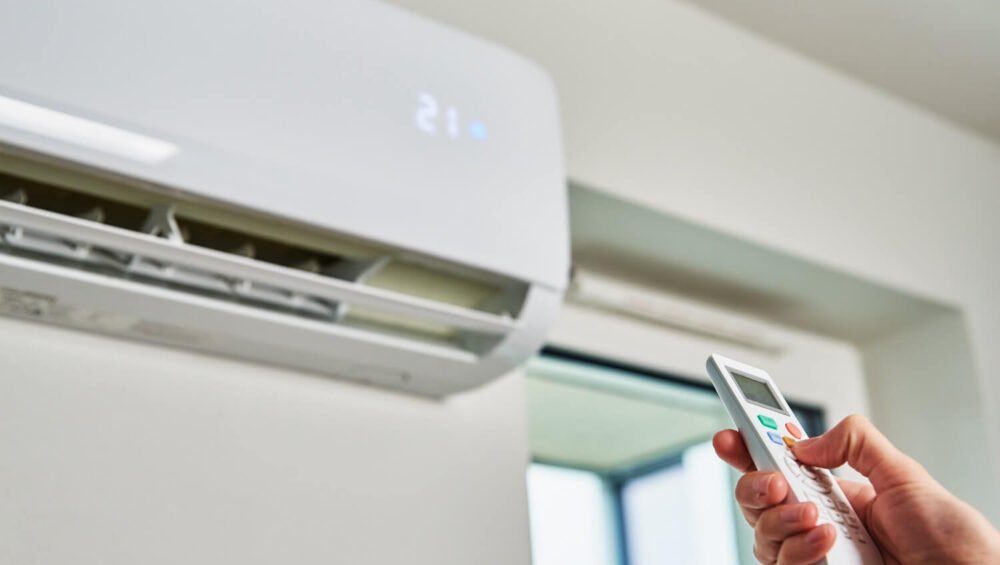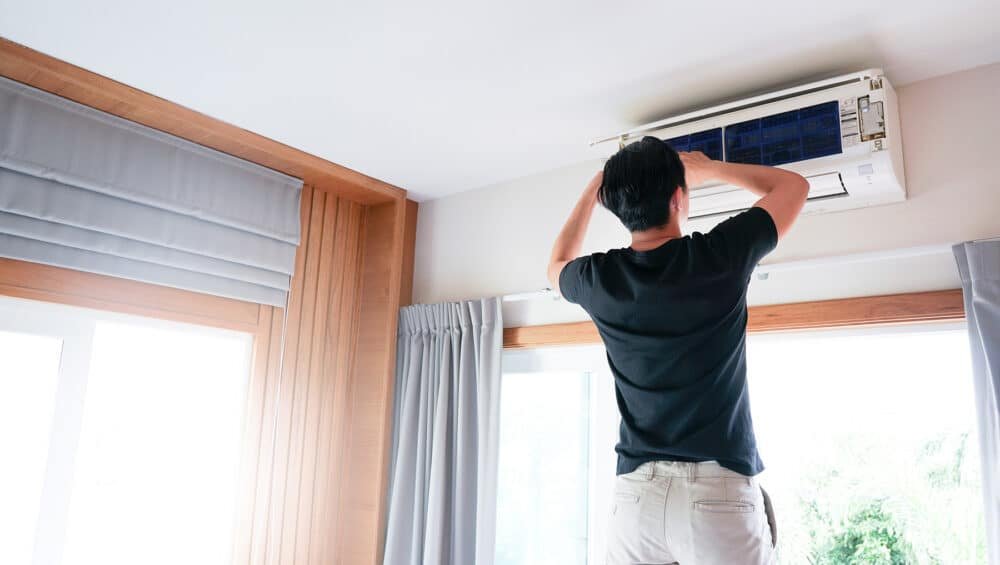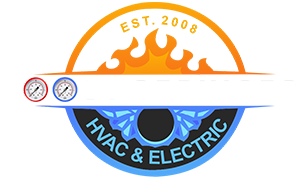When the sweltering summer heat hits, there’s nothing more frustrating than an AC unit that won’t start. Whether you’re a community-based entrepreneur looking to maintain a comfortable environment for your clients or a working-class individual simply trying to stay cool, understanding the common reasons why your AC unit won’t start can save you time, money, and stress. In this expanded article, we’ll delve deeper into the top four reasons your AC unit might not start and provide practical solutions to get your cooling system back up and running efficiently.

Table of Contents
Check Power Supply Issues When Your Outside AC Unit Won’t Turn On
One of the most straightforward reasons your outside AC unit might not be turning on is due to power issues. This could be as simple as a tripped circuit breaker or a blown fuse. However, it’s important to understand the nuances of these power-related issues to effectively troubleshoot and resolve them.
Check Your Circuit Breaker
First, head over to your electrical panel and check if any breakers have been tripped. A tripped breaker can occur due to an overload in the electrical system, possibly caused by using too many appliances at once. If the breaker controlling your AC unit has tripped, switch it off and then back on to reset it. It’s essential to observe if the breaker trips immediately after resetting, as this indicates a persistent issue that might require professional attention to prevent electrical hazards.
Examine the Fuses
If your AC unit uses fuses, check to see if any have blown. A blown fuse can prevent your unit from receiving power, and it usually happens due to a surge in electricity or a short circuit. Be sure to replace any blown fuses with ones of the correct amperage to avoid further issues. It’s advisable to keep spare fuses on hand, especially during peak summer months, to ensure quick replacements and minimal downtime for your AC unit.
Inspect the Power Supply
Beyond the obvious circuit breaker and fuse issues, it’s vital to examine the overall power supply to your AC unit. Check if the power cord is securely plugged into the outlet and that there are no visible signs of damage, such as fraying or exposed wires. Additionally, ensure that any switches or controls connected to the unit are set to the “on” position. Sometimes, a simple oversight in the power connection can be the reason behind the unit’s failure to start.
Thermostat Troubles

Your thermostat acts as the brain of your air conditioning system, dictating when it should turn on and off. If it’s not functioning correctly, your AC compressor might not kick on. Let’s explore the potential issues with the thermostat and how to address them effectively.
Ensure Proper Settings
Double-check that your thermostat is set to “cool” and the temperature is set lower than the current room temperature. It’s easy to accidentally set the thermostat to “heat” or “off,” which would prevent the AC from starting. Verify that the fan setting is on “auto” rather than “on,” which can sometimes lead to confusion about the AC’s operation. These simple adjustments can often resolve the issue without further intervention.
Inspect the Thermostat Batteries
If your thermostat is battery-operated, dead batteries could be the culprit. Replace the batteries and see if this resolves the issue. Regularly changing the batteries can help maintain consistent operation. It’s a good practice to check the battery status twice a year, coinciding with seasonal changes, to ensure uninterrupted AC functionality. Consider using high-quality batteries for longer life and reliability.
Check for Calibration Issues
Thermostats can occasionally become miscalibrated, leading to inaccurate temperature readings and erratic operation. Test the accuracy of your thermostat by comparing its reading with a reliable room thermometer. If there’s a discrepancy, consider recalibrating the thermostat according to the manufacturer’s instructions or replacing it if recalibration is not possible. Modern digital thermostats often have self-calibration features that simplify this process.
Condenser Unit Obstructions
The outdoor AC unit, or condenser, is crucial for your air conditioner’s operation. If it’s obstructed or dirty, it might not run efficiently or at all. Keeping the condenser unit clean and clear of obstructions is vital for optimal performance.
Clear Debris
Inspect the area around your outdoor unit for any debris, such as leaves, dirt, or branches that could be blocking airflow. Ensure that there’s at least two feet of clear space around the unit to allow proper ventilation. Keeping the area clear can prevent your unit from overheating and ensure it runs smoothly. Regularly cleaning the surrounding area, especially after storms or windy days, can prevent debris accumulation.
Clean the Coils
Dirty coils can also hinder your AC’s performance. Gently clean the coils with a hose to remove dirt and grime, ensuring the water pressure isn’t too high to avoid damaging the fins. Be careful not to damage the fins during cleaning, as they are delicate and essential for optimal airflow. Consider using a coil cleaner once or twice a year to maintain the coils’ efficiency and prolong the unit’s lifespan.
Check the Fan Blades
The fan blades in the condenser unit play a significant role in cooling efficiency. Make sure the blades are free of dirt and debris, as accumulated grime can disrupt airflow and reduce the unit’s effectiveness. Gently clean the blades using a soft brush or cloth, taking care not to bend them. Damaged or bent blades may require professional adjustment or replacement to restore the unit’s performance.
Compressor Malfunctions
The compressor is the heart of your air conditioning unit, and if it’s not working, your system won’t be able to cool your space. Addressing compressor issues promptly is crucial to prevent further damage and costly repairs.
Inspect for Visible Damage
Look for visible signs of damage or wear on the compressor. If there are any burnt wires or connections, you may need a professional to repair or replace the damaged parts. Regularly inspecting the compressor for leaks or rust can help catch potential problems early. Addressing these issues promptly can prevent more significant damage and ensure the longevity of your AC unit.
Listen for Unusual Noises
When your AC is running, listen for any unusual noises coming from the compressor. Grinding, rattling, or hissing sounds could indicate a problem that needs professional attention. These noises may result from loose components, refrigerant leaks, or motor issues. Early detection and intervention can prevent more extensive damage and maintain the efficiency of your AC system.
Monitor Performance
Pay attention to how your AC unit performs over time. If you notice a decline in cooling efficiency or increased energy consumption, it might indicate compressor issues. Regular maintenance checks can help identify performance problems before they escalate. Keeping a record of performance changes can also assist technicians in diagnosing and resolving issues more effectively.

When to Call a Professional
While many issues with your AC unit can be resolved with a bit of DIY troubleshooting, some problems are best left to the experts. If you’ve checked all the above and your unit still won’t start, it might be time to call a professional HVAC technician. They can diagnose and fix more complex issues, ensuring your system is running safely and efficiently.
Regular Maintenance
To prevent future issues, consider scheduling regular maintenance for your air conditioning system. A professional can perform a thorough inspection, clean components, and address any potential problems before they become major repairs. Regular maintenance not only extends the lifespan of your AC unit but also improves its efficiency, saving you money on energy bills in the long run. Establishing a maintenance schedule can also provide peace of mind and ensure your system is ready for peak performance during the hottest months.
Warranty and Insurance Considerations
Before attempting any repairs, check if your AC unit is still under warranty or covered by insurance. Some repairs or replacements might be covered, reducing your out-of-pocket expenses. Additionally, professional repairs conducted by certified technicians often preserve warranty validity, protecting your investment. Always retain documentation of maintenance and repairs for future reference and potential warranty claims.
Safety Concerns
Handling electrical components and refrigerants can pose safety risks if not done correctly. If you’re unsure or uncomfortable with any aspect of troubleshooting, it’s best to consult a professional. They have the expertise and tools to safely address complex issues, ensuring both your safety and the optimal operation of your AC system. Prioritizing safety over cost can prevent accidents and further damage to your unit.
Conclusion: Solving the Problem When Your AC Unit Won’t Start
Understanding the common reasons why your AC unit won’t start can empower you to address the issue quickly and efficiently. By checking power sources, ensuring the thermostat is functioning, removing obstructions, and inspecting the compressor, you can often resolve the problem without professional help. However, don’t hesitate to contact an HVAC specialist if the issue persists or if you’re uncomfortable performing any of these tasks.
By maintaining your AC system and addressing issues promptly, you can ensure a comfortable and reliable cooling solution for your home or business, enhancing your reputation for providing dependable and high-quality services. Regular maintenance and timely interventions not only improve your AC unit’s performance but also extend its lifespan, offering long-term savings and peace of mind.
Remember, a well-maintained air conditioning system not only keeps you cool but also saves energy and reduces costs in the long run. Stay proactive, and enjoy the comfort of a smoothly running AC unit all summer long. Taking these steps ensures you remain cool and comfortable, no matter how high the temperatures soar outside.
FAQ — AC Unit Won’t Start
What are the most common reasons an AC unit won’t start?
Typical causes include incorrect thermostat settings, dead thermostat batteries, a tripped breaker or blown fuse, a tripped float safety switch from a clogged drain, a failed capacitor or contactor, or a loose low-voltage control wire.
How should I check the thermostat first?
Confirm the mode is set to Cool, the fan is set to Auto, and the setpoint is at least 3 to 5 degrees below room temperature. Replace thermostat batteries and verify the display is on and responsive.
Could a tripped breaker stop my AC from starting?
Yes. Check the electrical panel for a tripped breaker labeled AC or Condenser and reset it once. If it trips again, do not keep resetting. Call a professional to diagnose the electrical fault safely.
What is a float switch and how can it prevent startup?
A float safety switch shuts the system down when the condensate drain pan fills with water. If your unit will not start and you notice water near the air handler, the drain may be clogged and the float switch is doing its job.
Can a clogged condensate drain stop the AC from running?
Yes. A blocked drain line can trigger the float switch and prevent startup to avoid water damage. Clearing the drain and restoring flow will allow the system to run again.
Do dirty or frozen coils keep an AC from starting?
Severely dirty coils can cause high pressure, and frozen evaporator coils can force safety shutdowns. Allow ice to melt fully and schedule coil cleaning to restore normal operation.
Could the outdoor disconnect or service switch be off?
Yes. Ensure the outdoor condenser disconnect is in the On position and any indoor service switch near the air handler is on. If power was recently off for service, verify both switches.
How do failed capacitors or contactors prevent startup?
Capacitors provide the boost motors need to start. A failed capacitor or pitted contactor can keep the compressor or fan from engaging, leading to no-start or humming without operation.
Can low refrigerant cause the AC not to start?
Indirectly. Low charge from a leak can trigger pressure safety switches or cause icing that leads to shutdown. Only a licensed technician should locate the leak, repair it, and recharge the system.
What quick checks can I do before calling a technician?
Try the following steps:
- Set thermostat to Cool and lower the setpoint
- Replace thermostat batteries
- Check and reset a tripped breaker once
- Verify outdoor disconnect and indoor service switch are on
- Inspect for water in the drain pan and clear the drain if safe
Why does my AC try to start and then immediately stop?
This short attempt could indicate a weak capacitor, high head pressure from a dirty condenser coil, a failing motor, low voltage, or control board issues. Professional diagnosis is recommended.
Is a blown fuse near the air handler a common no-start cause?
Yes. Some systems have low-voltage fuses that blow during shorts or wiring faults. If a fuse is blown repeatedly, a technician should trace and correct the underlying problem.
When should I turn the system off and call a professional immediately?
Call right away if breakers keep tripping, you smell burning, see smoke, hear loud buzzing or popping from the unit, or find ice buildup on refrigerant lines or the indoor coil.
How can I reduce the chance of future no-start issues?
Schedule annual tune-ups, keep coils clean, change filters every 30 to 60 days in summer, keep 24 inches of clearance around the outdoor unit, flush the condensate drain, and address electrical or refrigerant issues promptly.

